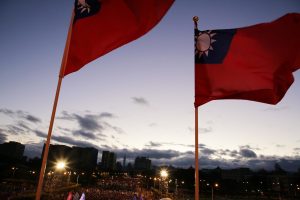Since the Democratic Progressive Party (DPP) came to power and President Tsai Ing-wen assumed office in 2016, China has actively pressured other countries to isolate Taiwan. In the past decade, China has attempted to unilaterally shrink Taiwan’s international space by poaching its diplomatic allies; Taiwan has only 14 left as of October 2022.
Recently, there was news of Paraguay – one of those 14 allies – asking for $1 billion from Taiwan in exchange for its commitment to maintain diplomatic ties. It is a unique challenge given Taiwan’s international status.
Despite China’s attempts to isolate Taiwan, the island nation has been trying to maintain its diplomatic allies along with reaching out to like-minded countries. In 2021, for example, Taiwan launched the “Give Taiwan a Voice” campaign to protest its exclusion from the United Nations. “The UN should welcome Taiwan’s meaningful participation,” the campaign proclaims, urging people to “Speak up for Taiwan!”
To make Taiwan’s voice heard, it has become all the more compelling for Taiwan to look beyond its formal diplomatic allies and employ non-conventional methods of diplomacy. The New Southbound Policy, introduced by Tsai in 2016, has been instrumental for Taiwan’s regional strategy for Asia, and this could be further clubbed with the “Give Taiwan a Voice” campaign to accrue benefits in the Indo-Pacific region.
The COVID-19 pandemic and the emergence of the Indo-Pacific concept gave Taiwan a much-awaited opportunity to exhibit how it is more aligned with the liberal democracies. At the same time, Taiwan is reaching out to Asia systematically, though some of these steps are going unnoticed and unappreciated. One of the important developments was the launch of the New Southbound Policy by Tsai, which involved several new steps to connect with regional countries. Specifically, the policy targets the countries of South and Southeast Asia, as well as Australia and New Zealand.
At the Yushan Forum in 2018, Tsai highlighted the significance of the New Southbound Policy and the spirit of the policy in her address, “Taiwan helps Asia, and Asia helps Taiwan.” The message was clear: Taiwan wants to diversify its external engagement and strengthen ties with its immediate and extended neighbors in the region.
Taiwan is reaching out to Asia through a number of initiative across both government- and non-government-led channels. In a process to enrich its engagement with Asian countries based on cross-sectoral partnership, Taiwan has focused on non-governmental platforms such as civil society and think tanks. To streamline some of its efforts, new think tanks were established and more dialogue forums were launched. One important example in this context was the establishment of the Taiwan-Asia Exchange Foundation (TAEF) in 2018. One of the major goals of the TAEF has been to highlight the social innovation and progress in Taiwan as a source of strength for Taiwan’s bilateral engagement that goes beyond the China factor.
The TAEF holds an annual dialogue, Yushan Forum, designed to foster exchanges in line with the New Southbound Policy. The 2022 edition of the Yushan Forum, themed “Revitalization, Reorienting, and Reconnecting,” shed light on the resilient prospect and regional roadmap of the post-pandemic recovery, and how the inclusion of Taiwan as a responsible partner can facilitate shaping the new regional architecture of the Indo-Pacific. Additionally, other prominent think tanks in Taiwan, such as the Prospect Foundation, organize the Indo-Pacific Dialogue. Given the New Southbound Policy is a subset of Taiwan’s wider Indo-Pacific strategy, such dialogues connect Taiwan with the major stakeholders in the Indo-Pacific region.
At a time when China is militarily intimidating Taiwan, it is even more important for Taiwan to make use of its vibrant think tank culture and resources focusing on Asia to make its voice heard. It also has the potential to contribute to the post-pandemic recovery and resilience as well as in shaping the new regional economic frameworks in Asia.
Campaigns aiming to change public perception and raise awareness are good, but what Taiwan needs is a long-term solution. It needs partners and friends that could amplify Taiwan’s voice. While Taiwan has strong support from countries such as the United States, Japan, and European democracies, it is vital for the country to bolster its New Southbound Policy and reach out to other major Indo-Pacific stakeholders.
Taiwan is utilizing its think tanks and dialogues among the strategic communities and civil society to bolster relationships in the Indo-Pacific. Taiwan’s outlook is changing and there is a realization among the policymakers that Taiwan needs to go beyond traditional areas of cooperation such as security and economic cooperation, and embrace fresh ideas.
As Taiwan is revitalizing and reorienting its New Southbound Policy and reconnecting with like-minded countries in the Indo-Pacific, it will be beneficial for Taiwan to add more weight to the policy by making it a part of its “Give Taiwan a Voice’” Campaign.

































